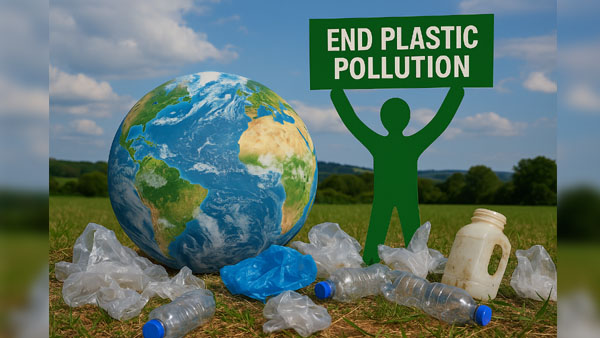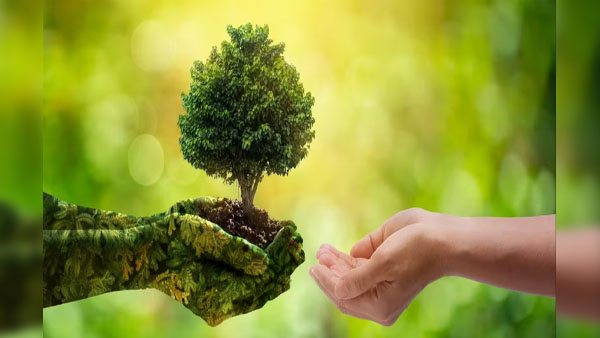By Dipak Kurmi
As the world gears up to commemorate World Environment Day 2025 on June 5, a clarion call to “End Plastic Pollution” resonates across the globe, spotlighting one of the most pressing environmental crises of our time. This initiative, led by the United Nations Environment Programme (UNEP), comes at a pivotal moment when the world is expected to consume a staggering 516 million tonnes of plastics in 2025, an alarming figure that underscores the urgent need for systemic change. Hosted by the Republic of Korea in Jeju Province, this year’s celebrations aim to galvanize collective action to curb the pervasive impact of plastic waste, which has infiltrated every corner of the planet—from the depths of the Mariana Trench to the peaks of Mount Everest, and even into the human body through microplastics. With the theme firmly centered on ending plastic pollution, World Environment Day 2025 seeks to drive momentum for sustainable practices, reinforce global commitments, and pave the way for a healthier planet.
The scale of the plastic pollution crisis is staggering. In 2024 alone, humanity generated an estimated 400 million tonnes of plastic waste, a figure that has likely risen with the projected consumption of 516 million tonnes in 2025. Globally, 19–23 million tonnes of plastic waste leak into aquatic ecosystems annually, equivalent to 2,000 garbage trucks dumping their loads into oceans, rivers, and lakes every day. This deluge of plastic disrupts ecosystems, harms wildlife, and jeopardizes human health by entering the food chain as microplastics—tiny fragments found in drinking water, air, and even human organs. The annual social and environmental cost of this crisis ranges between US$300 billion and US$600 billion, exacerbating the triple planetary crisis of climate change, biodiversity loss, and pollution. Plastic, derived from fossil fuels, also contributes to climate change; as UN Secretary-General António Guterres has warned, “The more plastic we produce, the more fossil fuel we burn, and the worse we make the climate crisis.” Yet, amidst this daunting challenge lies a silver lining: plastic pollution is one of the most fixable environmental issues, with solutions like refusing, reducing, reusing, recycling, and rethinking plastics use readily available.
The Republic of Korea, hosting World Environment Day for the second time since 1997, has emerged as a global leader in sustainability, making it a fitting choice to spearhead this year’s efforts. Jeju Province, the designated host venue, has set an ambitious goal to become free of plastic pollution by 2040, implementing a unique system where household waste must be disposed of at designated recycling support centers, ensuring waste separation at the source and driving higher recycling rates. The country’s full life-cycle plastic strategy addresses every stage of plastic use—from production and design to consumption, reuse, and recycling—bringing together government, businesses, and consumers to transition toward a circular economy. This holistic approach aligns with global efforts to curb plastic waste, as evidenced by the Republic of Korea’s hosting of the fifth session of negotiations for a global plastic pollution treaty in November 2024, with the second part scheduled for August 5–14, 2025, in Geneva, Switzerland. World Environment Day 2025, occurring just two months before this critical meeting, serves as a timely platform to amplify the global commitment made in 2022 to end plastic pollution through a legally binding international treaty.
The urgency of this initiative is underscored by the pervasive impacts of plastic pollution on both the environment and human livelihoods. In developing countries, approximately 20 million waste pickers collect plastic waste to earn a living, often without employment rights or access to health insurance, despite being responsible for nearly 60% of global plastic recycling. These workers, as highlighted by the International Labour Organization, face hazardous conditions, with cuts and infections being common occupational risks. Moustapha Kamal Gueye, Director of the Action Programme on Just Transition at the International Labour Organization, has emphasized the need for a “just and inclusive” transition, ensuring that waste pickers are guaranteed fundamental rights, including a safe and healthy working environment. World Environment Day 2025 aims to spotlight these unsung heroes, advocating for their inclusion in broader efforts to tackle plastic pollution while promoting sustainable practices that benefit both people and the planet.
The global movement to BeatPlasticPollution has gained significant traction in the lead-up to June 5, with communities worldwide mobilizing to take action. Posts on X from organizations like Swachh Bharat Mission in India reflect this momentum, encouraging citizens to choose cloth bags over plastic, deposit plastic waste at Reduce, Reuse, Recycle (RRR) centers, and take a Green Pledge as part of a week-long campaign from June 1 to 5. Similarly, initiatives in the Maldives, as shared by the Ministry of Tourism on X, highlight the global scale of the problem, noting that over 400 million tonnes of plastic are produced annually, with less than 10% recycled, much of it ending up in oceans and harming ecosystems. These grassroots efforts, coupled with high-profile endorsements from figures like actor Zeenat Aman and UNEP advocate Jason Momoa, who urged their millions of followers to join the movement, illustrate the power of collective action in driving change.
World Environment Day, established by the United Nations General Assembly in 1972 during the Stockholm Conference on the Human Environment, has grown into the largest global platform for environmental outreach, engaging tens of millions of people across 150+ countries. Over the past five decades, it has catalyzed real-world impact, from India’s 2018 pledge to eliminate single-use plastics by 2022 to the UK’s 2024 announcement of over GBP 8 million in funding to protect rare wildlife and habitats. The 2025 theme builds on this legacy, emphasizing systemic change to address the plastic crisis. Solutions like banning single-use plastics, promoting reusable alternatives, and enhancing recycling systems are already in motion, with countries like Australia’s New South Wales implementing bans on plastic straws and cutlery, following similar measures in Victoria and Queensland in 2023. However, challenges remain, particularly in low-to-middle-income countries where mismanaged waste—estimated at one-quarter of global plastic waste—often leaks into the environment due to inadequate infrastructure.
The scientific community has also sounded the alarm on the far-reaching consequences of plastic pollution. Research from CGIAR’s WorldFish reveals high levels of microplastics in dried fish in Bangladesh, a staple food source, raising concerns about food safety and public health. Meanwhile, a 2025 study on Plastic Overshoot Day, projected to occur on September 5, highlights the point at which global plastic waste exceeds the capacity of waste management systems, leading to environmental pollution. This report underscores the need for a cap on global plastic production, which, if left unchecked, could nearly double plastic pollution by 2040. Circular economy solutions, if scaled, could reduce annual plastic pollution by 80% by 2040, but this requires innovative financing, mandatory disclosure of waste outputs by businesses, and robust national legislation.
As World Environment Day 2025 approaches, the global community stands at a crossroads. The projected consumption of 516 million tonnes of plastics in 2025 is a stark reminder of the scale of the challenge, but it also presents an opportunity to redefine humanity’s relationship with this material. From Jeju’s recycling initiatives to global treaty negotiations, the path to a plastic-free future is being paved through innovation, policy, and collective action. Whether through local clean-up drives, corporate pledges like the USD 1 billion commitment by the Alliance to End Plastic Waste, or individual choices to refuse single-use plastics, every effort counts. As the world unites on June 5 to BeatPlasticPollution, the message is clear: ending plastic pollution is not just a necessity but a shared responsibility—one that holds the promise of a sustainable, healthier planet for generations to come.
(the writer can be reached at dipakkurmiglpltd@gmail.com)




